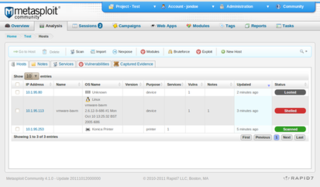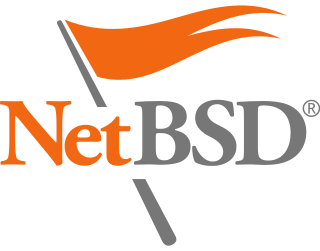A sanity check or sanity test is a basic test to quickly evaluate whether a claim or the result of a calculation can possibly be true. It is a simple check to see if the produced material is rational. The point of a sanity test is to rule out certain classes of obviously false results, not to catch every possible error. A rule-of-thumb or back-of-the-envelope calculation may be checked to perform the test. The advantage of performing an initial sanity test is that of speedily evaluating basic function.
In computing, cross-platform software is computer software that is designed to work in several computing platforms. Some cross-platform software requires a separate build for each platform, but some can be directly run on any platform without special preparation, being written in an interpreted language or compiled to portable bytecode for which the interpreters or run-time packages are common or standard components of all supported platforms.
Unit testing, a.k.a. component or module testing, is a form of software testing by which isolated source code is tested to validate expected behavior.

XNU is the computer operating system (OS) kernel developed at Apple Inc. since December 1996 for use in the Mac OS X operating system and released as free and open-source software as part of the Darwin OS, which, in addition to being the basis for macOS, is also the basis for Apple TV Software, iOS, iPadOS, watchOS, visionOS, and tvOS.
An application firewall is a form of firewall that controls input/output or system calls of an application or service. It operates by monitoring and blocking communications based on a configured policy, generally with predefined rule sets to choose from. The two primary categories of application firewalls are network-based and host-based.
In software testing, test automation is the use of software separate from the software being tested to control the execution of tests and the comparison of actual outcomes with predicted outcomes. Test automation can automate some repetitive but necessary tasks in a formalized testing process already in place, or perform additional testing that would be difficult to do manually. Test automation is critical for continuous delivery and continuous testing.
In software development, CruiseControl is a Java-based framework for a continuous build process. It includes, but is not limited to, plugins for email notification, Ant, and various source control tools. A web interface is provided to view the details of the current and previous builds. It allows one to perform a continuous integration of any software development process.
In computer security, a sandbox is a security mechanism for separating running programs, usually in an effort to mitigate system failures and/or software vulnerabilities from spreading. The sandbox metaphor derives from the concept of a child's sandbox—a play area where kids can build, destroy, and experiment without causing any real-world damage. It is often used to execute untested or untrusted programs or code, possibly from unverified or untrusted third parties, suppliers, users or websites, without risking harm to the host machine or operating system. A sandbox typically provides a tightly controlled set of resources for guest programs to run in, such as storage and memory scratch space. Network access, the ability to inspect the host system, or read from input devices are usually disallowed or heavily restricted.
The Linux Desktop Testing Project (LDTP) is a testing tool that uses computer assistive technology to automate graphical user interface (GUI) testing. The GUI functionality of an application can be tested in Linux, macOS, Windows, Solaris, FreeBSD, and embedded system environments. The macOS version is named PyATOM, and the Windows version is Cobra. The LDTP is released as free and open-source software under the GNU Lesser General Public License (LGPL).

The Visualization Toolkit (VTK) is a free software system for 3D computer graphics, image processing and scientific visualization.
ITK is a cross-platform, open-source application development framework widely used for the development of image segmentation and image registration programs. Segmentation is the process of identifying and classifying data found in a digitally sampled representation. Typically the sampled representation is an image acquired from such medical instrumentation as CT or MRI scanners. Registration is the task of aligning or developing correspondences between data. For example, in the medical environment, a CT scan may be aligned with an MRI scan in order to combine the information contained in both.

The Metasploit Project is a computer security project that provides information about security vulnerabilities and aids in penetration testing and IDS signature development. It is owned by Boston, Massachusetts-based security company Rapid7.
Laminas Project is an open source, object-oriented web application framework implemented in PHP 7 and licensed under the New BSD License. The framework is basically a collection of professional PHP-based packages. The framework uses various packages by the use of Composer as part of its package dependency managers; some of them are PHPUnit for testing all packages, Travis CI for continuous Integration Services. Laminas provides to users a support of the model–view–controller (MVC) in combination with Front Controller solution. MVC implementation in Laminas has five main areas. The router and dispatcher functions to decide which controller to run based on data from URL, and controller functions in combination with the model and view to develop and create the final web page.
The FreeBSD Ports collection is a package management system for the FreeBSD operating system. As of February 2020, there are over 38,487 ports available in the collection. It has also been adopted by NetBSD as the basis of its pkgsrc system.

FreeBSD is a free and open-source Unix-like operating system descended from the Berkeley Software Distribution (BSD). The first version of FreeBSD was released in 1993 developed from 386BSD and the current version runs on x86, ARM, PowerPC and RISC-V processors. The project is supported and promoted by the FreeBSD Foundation.
qmake is a utility that automates the generation of makefiles. Makefiles are used by the program make to build executable programs from source code; therefore, qmake is a make-makefile tool, or makemake for short.

NetBSD is a free and open-source Unix-like operating system based on the Berkeley Software Distribution (BSD). It was the first open-source BSD descendant officially released after 386BSD was forked. It continues to be actively developed and is available for many platforms, including servers, desktops, handheld devices, and embedded systems.
Google Test, often referred as gtest, is a specialized library utilized to conduct unit testing within the context of the C++ programming language. This library operates under the terms of the BSD 3-clause license, which dictates the terms of its usage and distribution. Google Test is structured based on the xUnit architecture, a systematic methodology for assessing software components.




